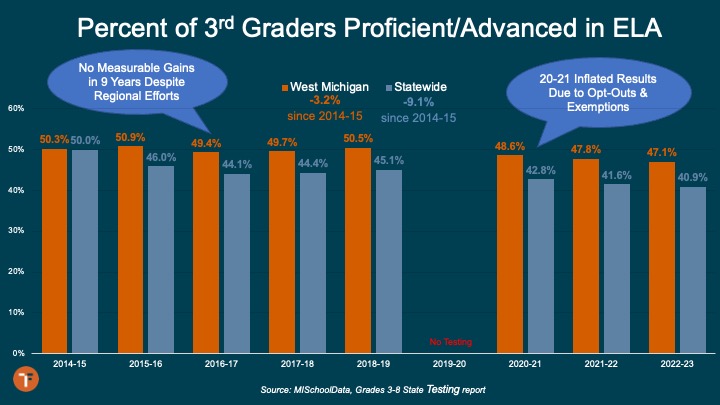The alarm bell is still ringing, but we are seeing signs that communities are waking up to the early literacy crisis that has been building for years in Michigan.
The challenge now is turning that attention into action. If we fail in this, we risk leaving a generation of children woefully unprepared for the rest of their lives and careers, with dire consequences for employers, families, children and the entire state.
Judging from TalentFirst’s experience at the recent Annual Leadership Conference hosted by the Michigan Association of School Boards, awareness is growing that this is an urgent problem demanding an urgent response.
Understanding what’s working, what’s not
At a well-attended session on Striving for Early Literacy Success, TalentFirst’s Director of Education Innovation Lisa Hungerford introduced school board members to our dashboard of third-grade reading scores for nearly every elementary school building in the state.
The dashboard documents building-level reading scores on the Michigan Student Test of Educational Progress, cross-referenced to the percentage of students who participate in the free or reduced-price lunch program. This allows comparisons of schools of similar economic status because the evidence shows poverty levels are a factor — but not the only one — in academic performance.
What it reveals is that some schools are outperforming their economic peers, while others are underperforming. In many cases there are significant gaps comparing schools within the same district.
The question is: What are the better-performing schools doing right?
That is the purpose of the dashboard, and one of the questions that school leaders at the MASB session posed. TalentFirst’s goal is to equip parents, school board members, educators, and policymakers with the information they need to ensure all kids have high-quality early literacy instruction. In addition to the dashboard that allows exploring reading performance, the resources include a guide to asking the right questions (PDF) about local academic performance.
We need the involvement of all these stakeholders. Despite significant investment by the state, we have seen no measurable improvement for years — even as other states have advanced. The most recent M-STEP scores showed statewide third-grade reading proficiency at its lowest levels for full-scale testing since the M-STEP was adopted in 2015. (Due to the pandemic, M-STEP testing was not conducted in 2019-20, and the assessments saw a lower completion rate in 2020-21.) The latest scores show just 40.9% of the state’s third-graders scored proficient or advanced for reading.

Other states have figured this out, and they are leapfrogging Michigan as a result. On the National Assessment of Educational Progress (NAEP) in 2022, Michigan ranked 43rd among the states for fourth-grade reading proficiency — down 11 places from the already poor showing in 2019.
More encouragement in West Michigan
As a West Michigan-based organization, TalentFirst’s member CEOs have long been at the forefront of demanding an urgent response to this crisis.
Their interest is not limited to their need for a well-educated workforce — they understand that reading is an essential building block for lifelong success. Children who can’t read or who read poorly are more likely to drop out of school. They are more likely to face lives of unemployment, poverty and crime.
The region’s education leaders share this concern. As a result, we have developed productive, collaborative relationships with educators. Discussions with superintendents and other K12 leaders continue around our proposed strategies for a regional response:
- Launching a region-wide initiative dedicated to improving 3rd-grade reading proficiency.
- Setting a target: 80% of 3rd graders are reading proficiently by 2030, with annual benchmarks.
- Requiring the use of high-quality, scientifically validated practices and materials for reading instruction in every classroom across the region.
- Convening West Michigan teaching college deans to discuss the need to instruct aspiring teachers in the science of reading and proven curricula.
We’re also collaborating with superintendents and building-level leaders on a recognition program to celebrate — and learn from — schools that are showing improvement by implementing core strategies and research-based best practices.
Additionally, one of the 2024 goals for our K12 Working Group will be to establish a community of practice for school board members to coach them on what they need to know to about early literacy instruction and how to drive the conversation with their district leaders.
Leveraging resources for best practices
Hungerford was joined at the MASB presentation by Melanie Coburn, director of curriculum & community initiatives for the Center for Sound Literacy. (The center was co-founded by John Kennedy, president and CEO of Autocam Medical and a member of TalentFirst’s CEO Council.)
Coburn said research shows that one of the most effective tools in improving literacy is by supporting teachers with high-quality coaching. One transformative resource is the Michigan LETRS (Language Essentials for Teachers of Reading and Spelling) program.
LETRS training is free for participants through a state training grant. While the biggest commitment is time — up to 168 hours for the full program — many attendees at the MASB presentation noted they provide a stipend to educators to complete the course. Others said they would explore reallocating funds to do the same.
Another powerful resource is the suite of Essential Instructional Practices created by the General Education Leadership Network, an organization formed by the Michigan Association of Intermediate School Administrators. The Literacy Essentials component of the program provides a framework for research-based instruction strategies and practices.
These kinds of comprehensive responses provide the best hope to solving Michigan’s reading crisis. We all have a stake — parents, educators, business leaders, policymakers — and we all have to work together to return Michigan to its status as a national model for literacy. Our children, families, businesses and the entire state depend on it.
To learn more or get involved with our efforts to improve early literacy, contact Lisa Hungerford at L.Hungerford@talentfirst.net.


